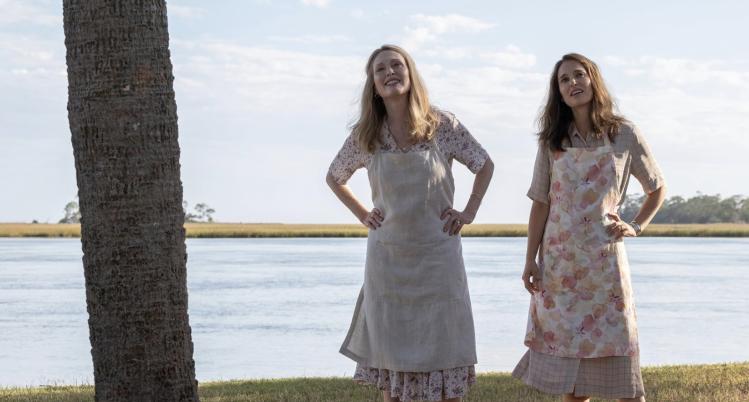
New York City hosts the last of the year’s major film festivals, and benefits from the sorting process. Highlights from Berlin, Cannes, Venice, and Toronto come pre-praised and garlanded with various awards. This year’s New York Film Festival includes the winners of the Golden and Silver Lions, as well as of nearly every category at Cannes—from Palme d’Or winner Anatomy of a Fall on down.
Among these is Thien An Pham’s Inside the Yellow Cocoon Shell, which won 2023’s Caméra d’Or for best debut feature. Pham’s film follows Thien (played by Le Phong Vu), a young man living a dissipated life in Saigon. When the film begins, he is drinking at a sidewalk restaurant, mocking his friend’s decision to go live a more spiritual life in the mountains. Like most of the film, the sequence is languorously paced, arranged in one long take that gives the viewer time to scrutinize Pham’s densely detailed frames. It begins to rain; then, suddenly, there is a shattering sound. Rather than cutting, Pham’s camera pans tensely across the tables and stalls, until, at long last, he shows us the aftermath of a crash: two motorbikes broken on the ground, two adults and a child scattered around them.
It’s a remarkably assured sequence, urban pandemonium delivered with clinical calm. It’s also a good bit of drama: the dead woman was Thien’s sister-in-law, and the surviving child his nephew Dao. Their accident upends his life. At first, Pham seems to be making an urban-migration drama, with Thien navigating Saigon, paying off officials, and bringing his nephew back to his cramped apartment.
About an hour in, though, Thien returns to his hometown with his sister-in-law’s body and Dao in tow. From this point on, all traces of tension, drama, and even movement disappear from the film, as the chaos of city life gives way to a hazy serenity defined by cloud banks and lush green foliage. The effect is gorgeous, and frequently dull. It calls to mind the atmosphere of films by the Thai director Apichatpong Weerasethakul. Instead of straightforward narrative, we get a slow, slow journey into the mystic interior, full of oblique conversations and elliptical imagery. But Weerasethakul’s films are defined by a constant sense of discovery and arrival. Pham’s debut jogs in place for long time without revealing much; his characters speak in blocks of exposition, an unwelcome contrast with the film’s many visual mysteries. Only when Thien drives off into the mountains in search of his long-lost brother does the film begin to pick up, moving at last into the realm of dreams and nightmares, where Pham can deploy his most disquieting imagery.
For Thien, the frontier is a zone of suggestion and self-discovery. For Samet, the main character of About Dry Grasses, it is a dead zone, a barren prison which must be escaped at any cost. The three-hour-plus About Dry Grasses is the latest epic from Turkish auteur Nuri Bilge Ceylan. Samet, played by Deniz Celiloglu, is a prickly art teacher who wants nothing more than to return to Istanbul from his provincial village post. He disdains his students and the principal at his school. When given the chance to betray his only friend Kenan (Musab Ekici), he jumps at it. The only person he seems to care about is Sevim (Ece Bagci), a promising eighth-grade student on whom he lavishes gifts, favors, and attention. Like much of this film, their relationship remains ambiguous, the greater part of it unspoken. Is Samet a predator? Or is he only playing favorites? It’s not clear whether he entirely knows.
When Sevim and a friend of hers accuse Samet and Kenan of inappropriate touching, the teacher reacts like a spurned lover, exiling her into the hallway and belittling her classmates. He denies the accusation to everyone, and the local authorities brush it under the rug. But is he guilty or not? Ceylan is comfortable withholding the answer, presenting hour after hour of unresolved questions, disputes, and slights. The film never resolves into either a cancel-culture screed or a denunciation of mob justice.
Ceylan has a novelist’s instinct for expansion, and his films act more like broad thematic compositions than tightly plotted stories. Each scene is presented as its own miniature drama, giving voice to a broad cross-section of this small border town’s society. Merve Dizdar deservedly won a Cannes prize for her peformance as Nuray, a teacher who has returned to her hometown after losing a leg to a suicide bomber. Her tete-a-tetes with Samet are some of the film’s tensest, and her bruised idealism serves as a counterweight to his restless self-pity. Moment by moment, Dry Grasses is engaging and visually pleasing, beautifying even the bleakest snowbound landscapes. Yet after all those hours, I wondered what, if anything, Ceylan and his cowriters thought they were illuminating. It’s brave, perhaps, to leave so much unresolved. But, for all the film offers, I was still left wanting more.
Dry Grasses turns on questions of freedom, choice, and consequence. The climax is a debate between Samet and Nuray over whether to engage with the world or hang back and protect oneself. Nuray argues for the value of ideals, even misplaced ideals; Samet for the need to keep free from the crowd. This, we learn, was behind his affection for Sevim, who stood apart from her cramped environment. Yet who was he to pluck her out of the crowd and favor her with special, unasked-for attention? And why was he allowed to do that?
The latter question electrifies Todd Haynes’s masterful May December. Working from a script by Samy Burch, Haynes turns the story of a Mary Kay Letourneau figure, played by Julianne Moore, into high melodrama. It has been more than twenty years since Gracie (Moore) was arrested for raping a thirteen-year-old student named Joe (Charles Melton)—more than long enough for a biopic to reclaim their story. So an actress named Elizabeth (Natalie Portman) comes to visit Gracie and Joe, who are now married, in a small island community outside Savannah, Georgia, where the couple live happily, and privately, with their adult children. Elizabeth will play Gracie in an upcoming film, and wants to understand her—an act of investigation that quickly becomes one of mimicry and reenactment.
It would be easy for Haynes to fixate on Gracie, a one-time tabloid headliner now living her life in a kind of cossetted self-exile. But in a post-screening Q&A, Burch said it was the character of Joe who inspired her script. She wanted to know how someone could live with such a past, how it would continue to shape their life well into adulthood. Joe tells Elizabeth that he wanted to have sex with Gracie, even though he was barely a teenager, and he means it. He seems happy in his life, and their marriage is a loving one. Yet in many ways Joe never really grew up, and despite all of his experiences he has never gained a true perspective on his experience. As Elizabeth digs deeper into their history, he begins to ask himself: Was I ever old enough to decide? Am I old enough now to know whether we did the right thing?
Haynes has Bergman’s Persona as a key influence, and the slippery question of identity hangs over the whole film. How do we become ourselves? Can we be warped in ways that completely impede self-understanding? Can we choose not to understand ourselves? In an electrifying scene late in the film, Joe and Gracie argue about the beginning of their relationship. He asks: Was I old enough to be making those decisions? And she counters: You seduced me. “Who was in charge?” she asks, a childish question that feels like a dodge. Joe may never have truly known himself, but Gracie has spent her whole life desperately avoiding self-knowledge.
There is no end to this story, and no bottom. Haynes is the rare American director uninterested in escape or catharsis, and Burch’s script provides no one with a way out. Hers is not a therapeutic narrative of emancipation from trauma. There is only the aftermath stretching out across the course of a lifetime. Perhaps Netflix viewers will be disturbed that May December neither condemns nor vindicates its characters—and by extension the viewers’ own prejudices. Perhaps they would prefer a movie like the one Elizabeth ends up making, which, from the little we see of it, looks godawful.
